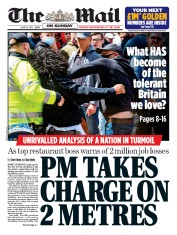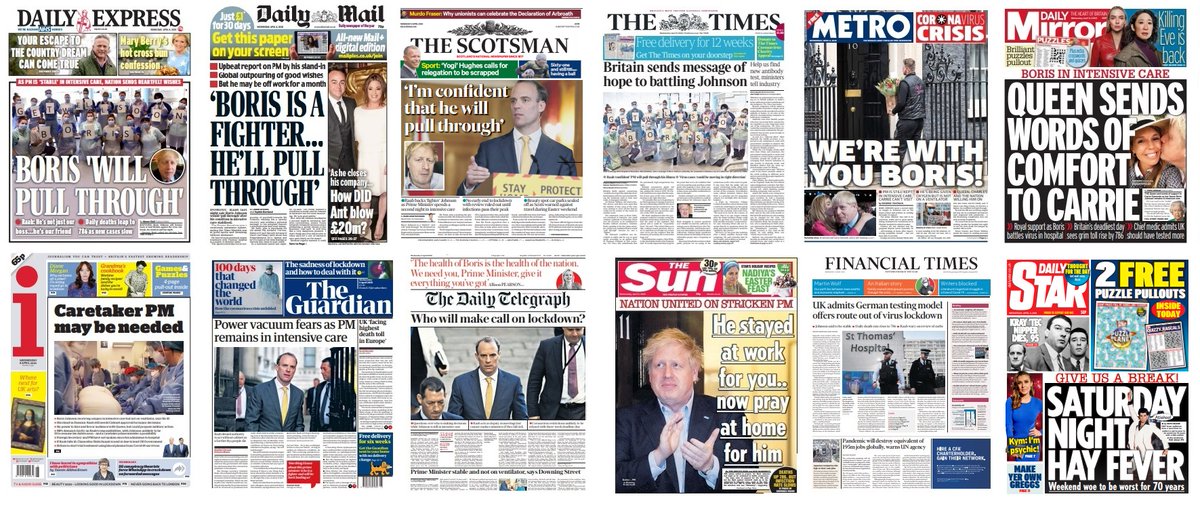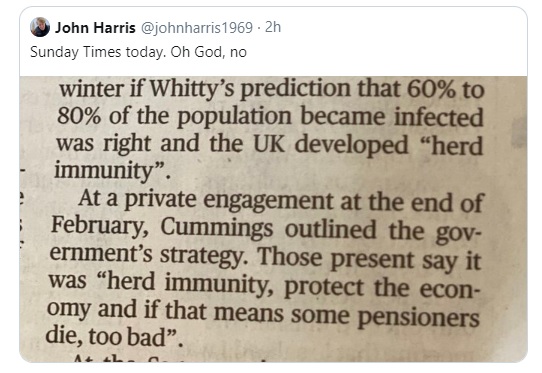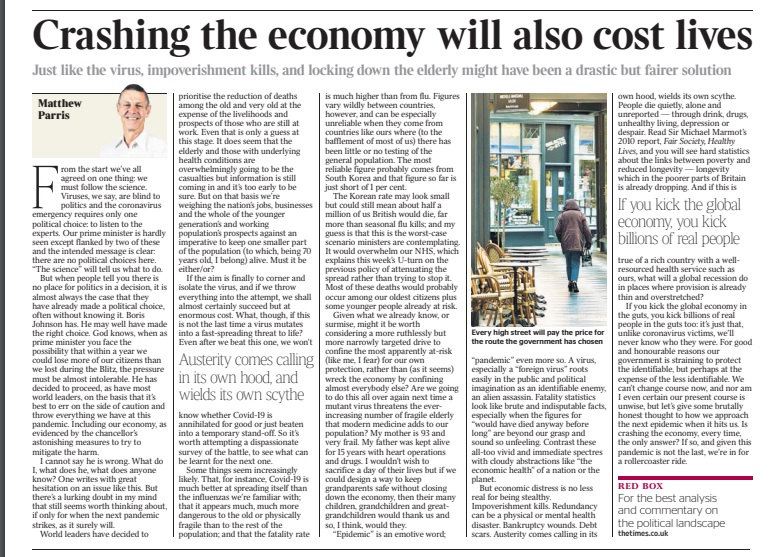
This is going to be a very long thread.
It is about the #bbc and is timed to coincide with @penguinbooks publication today of The War Against the BBC by @peterpeteryork and Patrick Barwise.
1/
It is about the #bbc and is timed to coincide with @penguinbooks publication today of The War Against the BBC by @peterpeteryork and Patrick Barwise.
1/

More particularly, this thread is about the way the BBC's media rivals - especially the Daily Mail - prosecute that war.
2/
2/
The timing is serendipitous as Prince William's intervention in the #panorama interview saga puts the corporation back on the front pages...
3/
3/

The Mail, which has led the chase on this 25th anniversary witch-hunt, is full of itself (but even it realises its readers care more about #Christmas and/or #covid)
4/
4/

This, remember is the Geordie Greig Mail, supposedly a kinder, gentler paper than that produced for a quarter of a century by Paul Dacre.
This thread will mainly focus on the last decade of Mr Dacre's reign
- and include some guest appearances by Mr Murdoch's publications.
5/
This thread will mainly focus on the last decade of Mr Dacre's reign
- and include some guest appearances by Mr Murdoch's publications.
5/
The BBC is much loved by those who watch and listen to it, much hated by newspapers who see it as a publicly subsidised threat in an era of falling circulations.
The hostility is open and almost universal.
6/
The hostility is open and almost universal.
6/
Here is a random collection of headlines from one week in October 2018, when I embarked on this research for Peter and Patrick's book.
7/
7/

And here's another collection from June last year, when the free licence for over-75s was under threat. A legitimate news story, certainly. But while we're at it, we'll have a go on other issues as well. Boris "censored". When does editing become censorship? Discuss.
8/
8/

Over the last ten years of the Dacre reign, the Daily Mail carried >4,000 news stories with BBC in the headline or subhead, about 500 front-page stories mentioning the BBC, plus around 2,500 opinion columns and leaders.
9/
9/
About 30%-40% of the news stories were showbizzy: details of upcoming programmes (not listings) or the private lives of the stars therein - as related to the shows. Some (many) of these are sneering, but most were pretty innocuous.
10/
10/
As to the rest, the “general” news coverage, these are almost all hostile. Some are just about neutral: “viewers are turning off…” “viewers are complaining…” So about half the mentions of the BBC are antagonistic. If it makes the front page splash, it’s hostile. End of!
11/
11/

There are two particularly rich seams:
1: profligacy - spending our money, paying stars too much, wasting money that should be spent on programmes. constant questioning of the licence fee and how it’s spent.
2: bias - it’s a hotbed of lefties.
12/
1: profligacy - spending our money, paying stars too much, wasting money that should be spent on programmes. constant questioning of the licence fee and how it’s spent.
2: bias - it’s a hotbed of lefties.
12/
Over those ten years, the words “fury”, “waste”, “bias” or “pay” appeared in headlines on Daily Mail stories about the corporation more than 8,000 times.
13/
13/
Of course, the standard argument is that the BBC is a public corporation with an obligation of neutrality, paid for with OUR (or rather YOUR) money. Newspapers are commercial enterprises with no duty to be impartial and are free to pay what they will for talent.
14/
14/
BBC bosses and stars should not be paid vast sums of money. But, at the same time, the failure to attract audiences or make original programmes is highlighted. There is apparently absolutely no correlation here.
15/
15/
@GaryLineker is, of course, a favourite target. He is paid a lot (not as much as Mr Dacre was, but that was ok because it wasn't coming from the taxpayer and he was *far* more entertaining and popular)
He is soft on refugees.
He employs accountants to minimise his tax.
16/
He is soft on refugees.
He employs accountants to minimise his tax.
16/

Nobody wants to pay more tax than they need. Some people, like the Daily Mail's owners, base themselves offshore to reduce liability to the UK Treasury.
But rivals, including Google and Apple, must pay up.
17/
But rivals, including Google and Apple, must pay up.
17/
In DacreWorld, it is also apparently the BBC's duty to check that its freelance contributors are paying as much as possible.
Does the Mail make sure that Martin Samuel doesn’t push his multi-thousands offshore?
18/
Does the Mail make sure that Martin Samuel doesn’t push his multi-thousands offshore?
18/

As a sole trader I should be outraged if, say, @theneweuropean started poking its nose into how I organised my tax affairs. Isn’t that between me and the taxman?
19/
19/
While we're looking at money, how about the #GenderPayGap?
The Mail made much hay with the Carrie Gracie row, but while it reported its own gap when it was required to do so, it has never felt the need to repeat that information when relishing the Beeb’s discomfort.
20/
The Mail made much hay with the Carrie Gracie row, but while it reported its own gap when it was required to do so, it has never felt the need to repeat that information when relishing the Beeb’s discomfort.
20/

(incidentally, it's worth noting how the paper changed up between editions from initially reporting the Gracie story on page 9 to making it the splash)
21/
21/

(and another aside...I found just found this triple whammy edition: tax avoidance, overpaid stars, gender pay gaps and Gary Lineker. All in one paper!)
/22
/22

But back to the gender pay gap...at the time of the Carrie Gracie row, the BBC’s median pay gap was 7.6%, the Mail’s 15.4% (and its median bonus gap 26.7%) and the Telegraph’s way into the 30s.
/23
/23
Moving on.
Attacks on the BBC take many forms and there's a lot of tangential stuff: a page lead about a couple of BBC DJs on sex charges. Who was this? Lauren Laverne? Chris Evans? No, a couple from Radio BackofBeyond, who will have been known to all of 2,000 people.
/24
Attacks on the BBC take many forms and there's a lot of tangential stuff: a page lead about a couple of BBC DJs on sex charges. Who was this? Lauren Laverne? Chris Evans? No, a couple from Radio BackofBeyond, who will have been known to all of 2,000 people.
/24
A woman having sex with schoolboys in a public park might make a small story on a slow day. But this case merited the full works on page 5 – with “BBC” the first word of the heading, as though as the employer it was somehow culpable.
/25
/25

The same goes for this extraordinary story from The Times.
A complaint about a headline? Don't newspapers get them every day? Do they write stories about them? I think not.
But these complainants were *very* high profile: Nigel Farage and the deputy PM of Latvia
/26
A complaint about a headline? Don't newspapers get them every day? Do they write stories about them? I think not.
But these complainants were *very* high profile: Nigel Farage and the deputy PM of Latvia
/26

Then there’s guilt by association and gratuitous swipes.
/27
/27
Attacks on the BBC are not restricted to its own activities. If there is a prevailing view that the paper doesn’t approve of, it attacks both that view and the BBC (and Labour lefties if possible) for reporting it - or, as the Mail would have it, for fomenting misconceptions.
/28
/28
Attacks on "the Left” often include completely pointless mentions of “and their friends at the BBC”, even where the BBC has nothing to do with the story at all and hence never reappears in the text.
/29
/29
Dacre's Mail would also criticise the BBC for failing to report stuff (aka censorship), conveniently forgetting that all news organisations make editorial decisions of what to cover and none can do everything.
/30
/30
This approach can create difficulties. The Mail delighted in the criticism of the BBC over the Cliff Richard raid and arrest
/31
/31

- but then joined the rest of Fleet Street in worrying that, er, actually, the judge’s ruling in the singer’s favour was a threat to press freedom.
/32
/32

And what happens when the BBC raps one of its presenters over the knuckles. Well it depends who it is. If it's sometime Mail columnist, Brexit-supporting John Humphrys, it goes like this:
/33
/33

If it's Emily Maitlis having a pop at Dominic Cummings over his Barnard Castle eyesight test, it goes like this...
/34
/34

Bias, bias, bias. There's so much of it at the Beeb. So much so that in September 2010 a new column was introduced, inspired by a piece by @montie, called Whinge Watch. It would monitor examples of bias...
/35
/35

That was on September 17. The next week there was another example. A month later another. And then? Nothing?
Oh dear, such a great idea...
/36
Oh dear, such a great idea...
/36

Right, thanks for sticking with it....now for a little detour into the world of Stephen Glover.
In that final decade of the Dacre era, Glover wrote about the BBC about a hundred times. In 73 of the pieces he was antipathetic.
/37
In that final decade of the Dacre era, Glover wrote about the BBC about a hundred times. In 73 of the pieces he was antipathetic.
/37
Many are little swipes, gratuitous insults thrown in to lump the BBC with some other hated institution (@Guardian, CofE or whatever), or snidey remarks suggesting that the mere reporting or non-reporting of an event proves how leftie/dangerous/out-of-touch the BBC is.
/38
/38
But there are also some 23 full-blown rants, including a couple of mournful pieces about the decline of Desert Island Discs and the Archers.
Writers have pet subjects. Mine are immigration and the media. But Glover and the BBC? Well, you have to admire his stamina..
/39
Writers have pet subjects. Mine are immigration and the media. But Glover and the BBC? Well, you have to admire his stamina..
/39

Of course, this is just one paper. You can imagine how long this thread would become if I did as much research into the Telegraph and the Murdoch papers. But here are a few little tasters...starting with the Sun and #Brexit
/40
/40

The two papers have more in common than a love of Brexit and a hatred of the BBC...
Neither can resist an acrostic..
/43
Neither can resist an acrostic..
/43

And of course both depend heavily on the BBC's output for "news" stories. Where would the tabs be without Strictly? Here's a little collection from the Sun.
See, they must love it really!
/44
See, they must love it really!
/44

The Press is just one of the BBC's enemies. There are many more, not least in the Tory party and the sefund the BBC lobby. You can read all about them in the book. Please buy it. And look out for launch events.
@PenguinUKBooks @torindouglas #chiswickbookfest
/45
@PenguinUKBooks @torindouglas #chiswickbookfest
/45
@ta_mills @JulianPetley
twitter.com/W4BookFest
coldtype.net/MediaNorth.html
penguin.co.uk/books/311439/t…
Have a good afternoon. And thank you for getting to the end of this longest piece of string.
twitter.com/W4BookFest
coldtype.net/MediaNorth.html
penguin.co.uk/books/311439/t…
Have a good afternoon. And thank you for getting to the end of this longest piece of string.
PS (just when you thought it was safe...)
This thread is not intended as a defence of the BBC (much as I love it).To many of us, its news output seems too Establishment, too cowed by government.
Rather it is a rough-and-ready analysis of the tactics used by some of its enemies.
This thread is not intended as a defence of the BBC (much as I love it).To many of us, its news output seems too Establishment, too cowed by government.
Rather it is a rough-and-ready analysis of the tactics used by some of its enemies.
*Defund the BBC*
Sorry
Sorry
• • •
Missing some Tweet in this thread? You can try to
force a refresh














